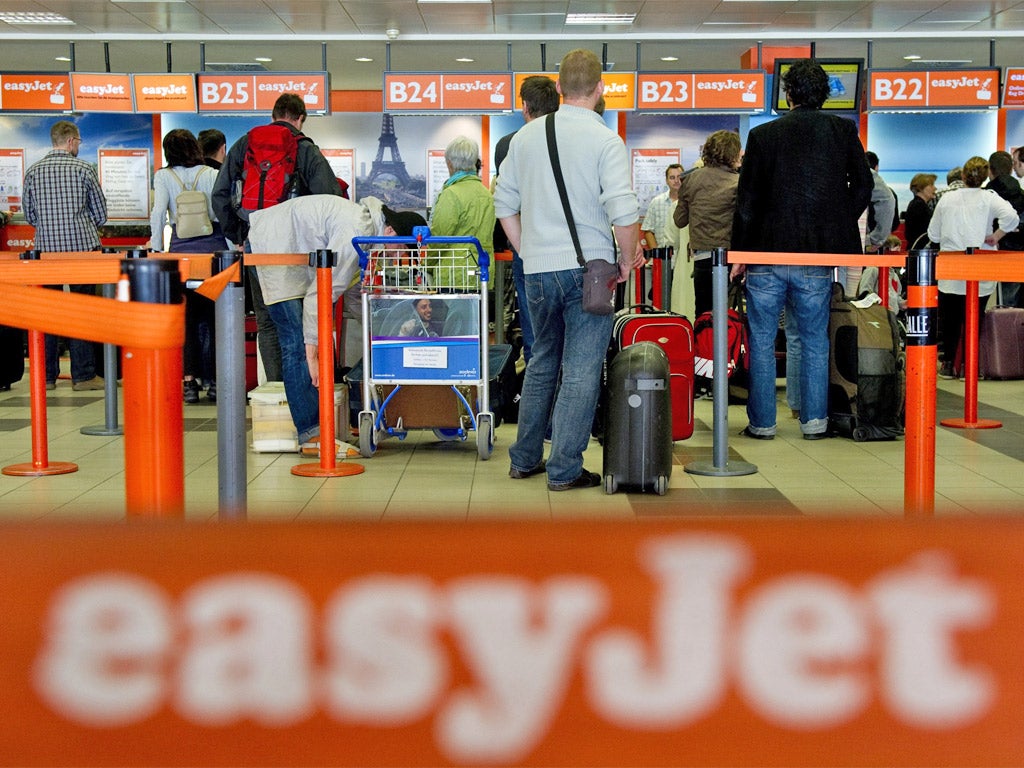Now boarding… calmly. EasyJet ends the scrum

Britain's biggest no-frills airline is to overturn one of its founding principles. From November, easyJet will replace the boarding free-for-all with allocated seats on all its flights.
The airline has been running trials for allocated seating under the codename BOSS ("bums on selected seats") since April. Seventy per cent of the 800,000 passengers surveyed said they preferred allocated seating.
"Allocated seating gives all our passengers a better boarding experience," said easyJet's chief executive, Carolyn McCall. Every passenger is entitled to have a seat allocated free. Those who want to guarantee a particular seat will pay £12 for extra legroom, £8 for a place in one of the "upfront" rows allowing swifter disembarkation, or £3 for other seats.
Ms McCall said: "On trial flights the majority of passengers were simply allocated seats when they checked in." The airline claims to use "the most advanced seating algorithm in world aviation," designed to seat together families, couples or colleagues on the same booking.
The new policy is to be rolled out during the month in which passenger numbers are at a minimum. It will take place in three tranches. At Gatwick – easyJet's biggest base – the change will be introduced at South Terminal on 13 November, with the North Terminal switching a week later.
The conventional business model for no-frills airlines has always involved unassigned seating. Douglas McNeill, equity analyst at Charles Stanley Securities, said: "If it can be done without slowing down the turnaround, and passengers are willing to pay for it, then perhaps conventional wisdom is wrong; easyJet's trial results suggest it is. Other low-cost carriers may now follow – but they'll probably want to see easyJet make it succeed across its whole network first."
BA's low-cost offshoot, Go, ran trials comparing allocated seats with the "first-come-first-served approach" and settled on assigned seats. The airline was taken over in 2002 by easyJet, which reverted to a free-for all.
Go's founder, Barbara Cassani, said yesterday: "It was clear to us that the boarding process using free seating was not faster and added significantly to customer stress. I think the flying public of Europe will be so much better off having the choice of flying with the prices and quality of easyJet and having an allocated seat."
Ryanair, Europe's biggest budget airline, offers allocated seating in the first two rows and the overwing exits, which offer extra legroom. A spokesman said: "It has proven very popular so we are likely to extend this to more rows… I don't think we will ever have the cabin fully allocated, as it would impact our 25-minute turnaround."
Monarch allocates seats, but passengers who choose not to pay extra to check in online are assigned a seat only at the departure airport.
Passenger planes set for formation flying
Passenger aircraft will soar up even faster on take-off and begin flying in formation like fighter jets in future, a major manufacturer has predicted.
Airbus believes that in the second half of this century, aircraft will pass a lot closer to each other on high-frequency routes. The changes will be aimed at clearing runways quicker and saving fuel.
The company also predicted that aircraft will taxi off runways more quickly and use "more sustainable biofuels and other potential energy sources".
Join our commenting forum
Join thought-provoking conversations, follow other Independent readers and see their replies
Comments
Bookmark popover
Removed from bookmarks